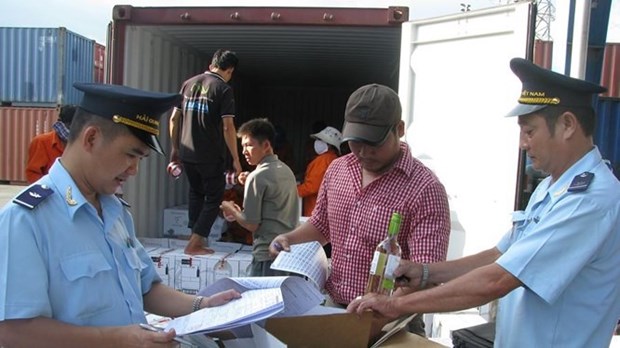Updated import regulations to increase trade
The application of a customs bond model would benefit the country, contributing to an increase of one per cent of the total import-export turnover according to comments by Minister and Chairman of the Government Office Mai Tien Dung.
 Customs officers conduct an inspection. — Photo vietimes.vn (Source: VNA)
Customs officers conduct an inspection. — Photo vietimes.vn (Source: VNA)Hanoi (VNS/VNA) - The application of a customs bond model would benefit the country, contributing to an increase of one per cent of the total import-export turnover according to comments by Minister and Chairman of the Government Office Mai Tien Dung.
Customs bond systems are designed to streamline the process for bringing goods into the country, thereby reducing the financial burden on businesses while ensuring the government receives all legally required taxes.
A customs bond is an agreement that ensures any importer will pay all fees and operate according to local laws and regulations.
Speaking at a Hanoi conference on facilitating trade on September 10, Dung said the Government has worked to create a competitive financial environment to facilitate business.
“The Government has taken specific measures, reducing unnecessary barriers to successful business,” he said.
He said that the ministries had reformed special inspection procedures, reducing the number of regulations from 9,929 to just 1,700 and streamlining the import-export process.
There is still work to be done, with authorities only meeting with 28.3 percent of the set targets so far.
The Government Office has urged ministries to cut unneeded regulations that impede growth and prevent new businesses from getting off the ground.
Thus far, 968 out of 6,213 requirements for new businesses have been simplified or eliminated. This makes up 25.5 percent of the planned changes.
Ministries have submitted 23 decrees to reform business conditions. It is expected that these decrees will reduce the number of conditions by 2,800.
“Last year, Vietnam’s GDP grew 6.81 per cent, and it is expected to reach 7 per cent growth this year thanks to the Government’s efforts to save time and cost for firms,” he added.
Business costs have been sharply reduced through the deregulation push. Firms reported 200 million USD in savings last year due to the reduced time it takes to implement simplified import-export procedures.
Nestor Scherbey, senior policy advisor to the Global Alliance for Trade Facilitation (GATF) in Vietnam, said outdated trade regulations and burdensome administrative procedures slow trade growth. He cited a World Bank study that calculates the cost of these unneeded regulations as equal to a 164.25 percent “Invisible Tariff”.
Scherbey said this has been the largest barrier to Vietnamese small and medium enterprises (SMEs), which make up 97 percent of Vietnamese firms.
The application of a modern customs bond system in Vietnam is expected to remove barriers while ensuring proper implementation of regulations.
A modern customs bond system will make it easier and cheaper for importers to bring goods into the country by simplifying the import-export process. Businesses will find it simpler to navigate customs checks and tariff policies.
Importers and those transporting goods domestically are required by the customs agency to purchase a bond from a surety company. If an importing company fails to pay fees or follow regulations, customs enforcement can file a claim. The surety company would then pay to a restitution fee. Finally, the importing company is required to reimburse the surety company.
GATF launched a new project in September 2017 to provide technical assistance for the Ministry of Finance (MoF)’s Insurance Supervision Authority. Ministries and State agencies regulating trade will also receive support.
The project means international WTO experts will help with the efforts to reform Vietnam’s trade regulations. The VNACCS/VCIS e-Customs system will also receive attention.
The ultimate goal is for State agencies involved with customs inspections to coordinate the implementation of a modern customs bond system with the General Department of Customs and MoF.-VNS/VNA












